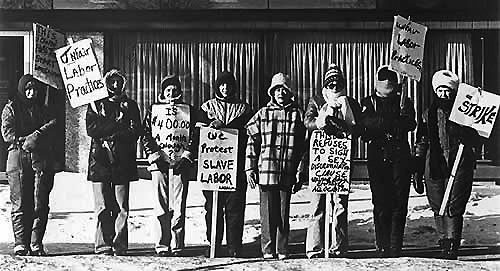
The weekend beginning December 14 and ending Dec. 16 was an extremely busy one in the history of the labor movement.
On Dec. 14 in 1995 some 33,000 striking members of the Machinists ended a 69-day walkout at Boeing after winning pay and benefit increases and important protections against subcontracting some of their work overseas.
In 1913, on Dec. 15. the AFL Convention passed a one-cent per capita assessment to “aid the organization of women workers.”
In 1921, on that same day, the Kansas national guard was called in to crush 6,000 protesting women who were going from mine to mine urging non-strikjng miners to join the strikers. The New York Times described the women as “an army of Amazons.”
On Dec. 15, in 1941, eight days after the attack by Japan on Pearl Harbor, the AFL pledged there would be no strikes in defense-related plants for the duration of World War II.
In 1967, on Dec. 15, meeting in its biennial convention, the AFL-CIO declared “unstinting support” for “measures the administration might deem necessary to halt Communist aggression and secure a just and lasting peace in Viet Nam.
On the same day that year the U.S. Age Discrimination in Employment Act became law. It bars employment discrimination against anyone aged 40 and older.
On Dev. 15, 2002, California’s longest nurses’ strike ended after workers at Doctors Medical Center in San Pablo and Pinole approved a new contract with Tenet Healthcare3 Corp., ending a 13 month walkout.
On Dec. 16, 1900, the controversial National Civic Federation was formed by business and labor leaders, prominent among whom was Sam Gompers, president of the AFL. The group was described as a “vehicle to resolve conflicts between management and labor.” Not all unionists agreed with the alliance, especially as it turned increasingly pro-business. :Labor withdrew after Gomper’s death in 1924.
On Dec. 16, 1902 New York City’s Majestic Theater became the first in the U.S. to employ women ushers.
In 1951 the Bagel Bakers of America started a slowdown at 32 of New York’s bagel bakeries in a dispute over health and welfare payments and workplace sanitation. Lox sales were down 30 to 50 percent during the slowdown, also.
In 1968 on Dec. 16, the Brotherhood of Railway Trainmen and the Brotherhood of Locomotive Firemen and Enginemen and Switchmen’s Union of North America all merged to form the United Transportation Union.
Finally, on Dec. 16, 1977, eight female bank tellers in Ellmar, Minnesota began the first strike against a bank in U.S. history.. At issue: they were paid little more than half of what male tellers were paid.
Photo: The Willmar 8. Workday Minnesota









Comments